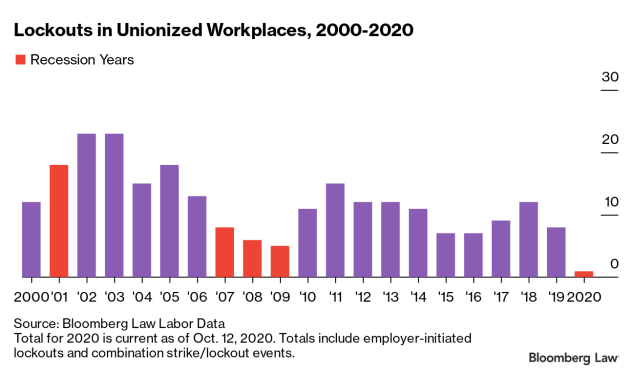2020 has presented a host of novel labor law issues. Bloomberg Law just released a report highlighting yet another oddity: there have been zero lockouts initiated by private sector employers thus far this year. You read that right: none.
For those unfamiliar with the concept of a lockout, it is an economic tool companies can use during collective bargaining negotiations. Once a labor agreement expires, employers are legally permitted to “lockout” their unionized workforce and refuse them work until the union accepts the terms proffered by the company for a new agreement. It’s a corollary of the union’s right to go on strike. While lockouts historically have not occurred nearly as often as strikes, they do happen and can be an effective tool for securing favorable contract terms. Of course, there are a lot of legal issues that need to be evaluated and navigated when it comes to implementing a lockout lawfully.
The following graph from Bloomberg Law provides lockout numbers from the last 20 years:
It is incredible that, this far into the year, there has yet to be a single lockout, given that we’ve seen them even in years when recessions hit companies hard. It’s impossible to know why this is, but there are several potential factors that may be affecting this.
First, with the pandemic, many companies and unions have decided to extend labor agreements that were set to expire in 2020. Almost every private sector collective bargaining agreement has a “no strike / no lockout clause,” meaning neither party can initiate such a work stoppage while that agreement is in effect. When labor contracts are extended, so are these clauses. Another reason for the lack of lockouts likely is the uncertainty in virtually every sector resulting from the pandemic. Locking out the workforce that has great familiarity with an operation may be too much to stomach right now for many companies. Finally, even if collective bargaining agreements haven’t been extended, many negotiations are being postponed until the parties can meet in person. In other words, they may not be happening as frequently this year. Lockouts often are implemented only after the parties go through extensive negotiations and reach an impasse.
This is a very interesting data point. While the year isn’t over, it looks like lockout numbers will be historically low. Employers should know, however, that even though we haven’t seen one yet in 2020, lockouts remain an available, and potentially effective, tool in labor agreement negotiations.














